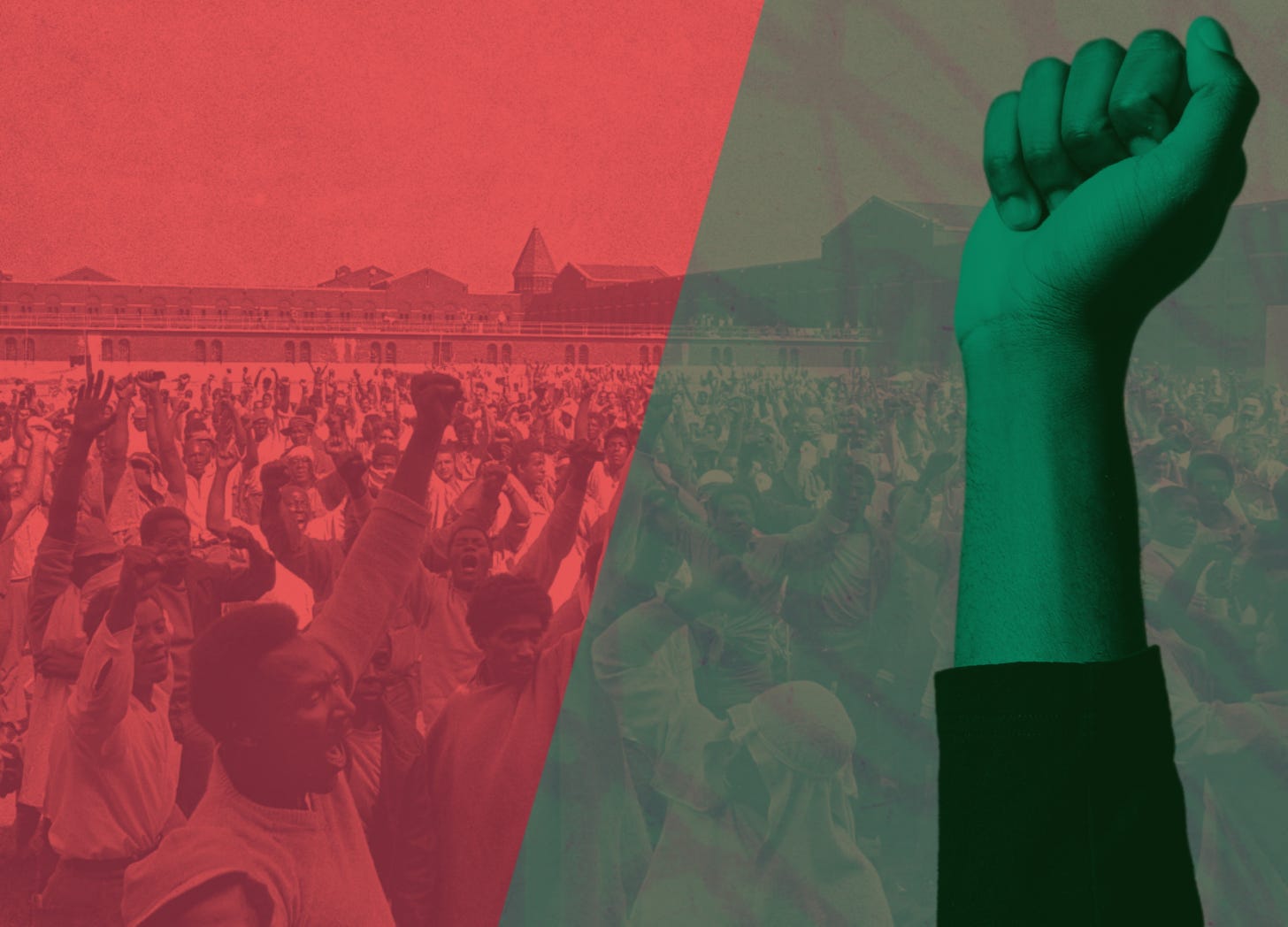The Power of Unity: Dismantling the Carceral State from Within
Black August reflections and a cover story for San Francisco Bayview
Attica Prison Uprising, 1971
Those who hold the keys to these cages understand exactly what they fear losing. Prison officials understand that knowledge is power, and they particularly fear the power that comes from understanding our history of resistance. They know that when we remember Jonathan Jackson’s courage, George Jackson’s intellectual development despite isolation, and the countless others who chose death over submission, we are less likely to accept our current conditions as inevitable. The state’s investment in forgetting is matched only by our investment in remembering, because memory is the foundation of resistance, and resistance is the foundation of freedom. (Kwaneta Harris for Truthout x Solitary Watch)
Take time to read more of Kwaneta’s powerful words about commemorating Black August from prison and how incarcerated people continue to transform “spaces of intended destruction into laboratories of liberation.”
The following essay was originally published in the August 2025 issue of the San Francisco Bayview, a national Black print newspaper that has been in circulation since 1976. The newspaper reaches people across the country, and it was actually Kwaneta’s incarcerated friend and comrade Uhuru Rowe who let us know that her story made the front page. Kwaneta is honored to have her work included in such a critically important, longstanding publication, and she invites people both in and outside prison walls to contribute to the dismantling of the carceral state.
From behind these walls, we see what others cannot — or will not — see: the profound failure of prisons as an answer to society's problems. As someone who has navigated this system, alongside countless abolitionists who have studied its machinery, I can attest that incarceration perpetuates rather than prevents harm.
Yet I find myself troubled when I hear my sisters inside cheering for someone who caused harm to join us in this misery. This reaction reveals how deeply we've internalized the punitive logic that keeps us all captive. When my neighbors inside ask what we'll do with rapists and murderers without prisons, I respond with my own questions: Which rapists? Which murderers?
The military that decimates communities abroad? The guards who assault with impunity? The police who kill unarmed civilians? The pharmaceutical companies profiting from addiction? The health insurance corporations denying life-saving care? These entities harm thousands, sanctioned by the state, yet face no consequences. The selective application of "justice" exposes that prisons exist not to address harm, but to control specific populations.
Self-examination must be our starting point. What could have helped you? What resources, support, or intervention might have prevented the circumstances that brought you here? Most of us can identify moments where different community responses, economic opportunities, healthcare access, or trauma support could have altered our trajectories. This reflection isn't about excusing harmful actions, but understanding that punishment after harm occurs does nothing to prevent it or heal those affected.
The carceral state stands upon several pillars that we, even from inside, can work to destabilize. The first pillar is legitimacy — the belief that prisons are necessary and effective. We can challenge this by documenting and sharing the realities of incarceration, writing to media outlets, participating in research studies, and maintaining connections with outside abolitionists who amplify our voices. Every testimony that reveals the truth of this system weakens its public support.
The second pillar is economic — prisons represent profitable ventures for corporations and governments alike. We can resist by refusing exploitative labor when possible, organizing work stoppages, boycotting commissary products from the worst corporate offenders, and educating ourselves about the financial structures that benefit from our captivity. By understanding who profits from our imprisonment, we identify our true opponents.
The third pillar is isolation — separating us from our communities and each other. Combat this through building solidarity across racial, ethnic, and social divisions that the system deliberately fosters. Start study groups on abolition, share resources and support with fellow incarcerated people, maintain and strengthen connections with family and community members outside, and participate in collective grievance processes when rights are violated.
The fourth pillar is the narrative that criminalizes marginalized populations. Counter this by developing political education programs inside, challenging dehumanizing language, sharing personal stories that complicate simplistic narratives about crime, and supporting initiatives that highlight the systemic factors leading to incarceration rather than individual moral failings.
For communities of color, immigrants, LGBTQ+ individuals, disabled people, and the poor, dismantling the carceral state isn't abstract theory — it's survival. These systems disproportionately target and traumatize our communities, separating families, destabilizing neighborhoods, and disrupting generations of potential.
Prison abolition recognizes that true safety comes not from isolation and punishment but from addressing root causes of harm: poverty, lack of healthcare, housing insecurity, and untreated trauma. The punishment system constantly reminds us we are powerless, but this is its greatest lie.
Throughout history, the most significant social changes have come from those deemed least powerful. Our resistance matters — whether through hunger strikes that exposed torture in California prisons, class action lawsuits that forced healthcare reforms, or education programs that transformed lives despite institutional opposition. When we unite across the artificial divisions they create between us, recognizing our shared humanity and common struggle, we discover power they cannot contain.
We are not merely the captives of this system — we are its most knowledgeable critics and therefore its most formidable opponents. Together, we can dismantle these walls: not just the physical ones that confine us, but the conceptual ones that limit our collective imagination about what justice truly means.



I'd like to hear Kwaneta's thoughts on the reformist & anti-Black limitations of popular prison abolitionism today. A collection of critiques is here:
https://types.mataroa.blog/blog/neo-abolitionism/